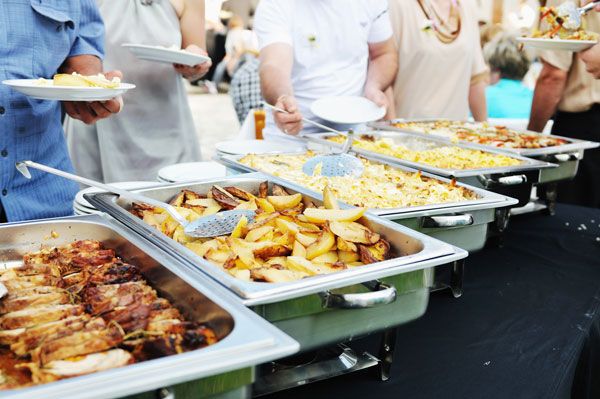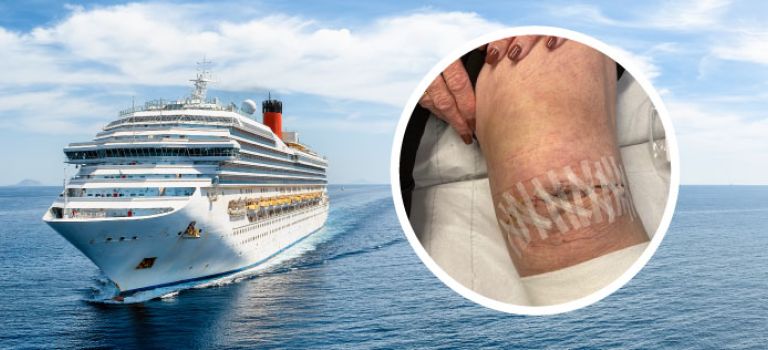Claims for food poisoning on holiday
Food poisoning can be distressing when it happens at home so experiencing such trauma in a foreign country can arguably leave people feeling even worse.
You can’t seek help because you don’t speak the language. You may feel trapped in a hotel room which isn’t a comfortable environment. If you do go outside, you don’t know where to find a chemist – and if you do find one maybe you can’t understand the medication.
Then there’s the stress of feeling that the holiday itself is being ruined for you and your family and that you’ve lost the value of a break worth potentially thousands of pounds.
What is food poisoning?
Food poisoning happens when someone eats contaminated food. Contamination happens if safety guidelines are not followed such as:
- not storing food correctly
- not cooking food thoroughly
- leaving cooked food sitting too long at warm temperatures
- serving chilled food at higher than optimal temperatures
- not properly reheating previously cooked food
- someone touching food when they are ill or have dirty hands
- cross-contamination such as using one chopping board for multiple foods
There are many food, hygiene and safety standards that food establishments are obligated to meet so that food is safe for consumption.
This is true for places abroad just as it is here in Scotland and the UK.
No win, no fee personal injury solicitors
The expression “No win, no fee” is often used in personal injury cases. It is used as a way of funding a compensation claim where the accident victim does not have the means to pay for the costs involved as the case progresses.
A number of solicitors are prepared to handle personal injury cases on a “No Win – No Fee” basis but very few are able to offer their clients complete protection if the case is unsuccessful.
In that event, the client could end up being liable for many thousands of pounds in legal expenses or the case won't be fully investigated and therefore likely to under-settle.
Compensate 'no win, no fee' funding
Digby Brown has its own funding company, Compensate, which provides the funding to allow the case to be fully investigated, employ the best experts surrounding the circumstances of the accident and/or injuries sustained and where and if necessary go to court.
If for whatever reason the case is unsuccessful, Compensate pays all your legal expenses and those of your opponent – you pay nothing.
On average our clients receive over 3 times the pre-litigation offer
Because of Compensate funding Digby Brown's success rate is extremely high and on average our clients receive three times the pre-litigation offer.
In the event the case is successful, a small percentage of your damages will be deducted with VAT to pay for this service. The percentage which Compensate will charge depends on the degree of risk involved. We believe that this is the fairest method of giving clients access to justice whilst ensuring their cases are fully investigated, prepared and funded.
Don’t take our word for it, just read many of the court decisions and case studies on our website.
Beware of compensation offers which may be too good
We know you will have seen many adverts offering 100% compensation or telling you that you will not lose any of your compensation, however we believe there are a number of problems with companies that do this.
- How do they make their money if they don’t charge you anything?
- If they aren’t taking any money from you, the client, what incentive do they have to ensure you receive the right level of compensation, appropriate to the injuries you have sustained?
- Fully preparing a case, finding out exactly what happened and what the consequences of your injuries may mean in the long term, is expensive, how do they do this properly?
- If they aren’t fully preparing these cases will they just accept the first offer they are given on your behalf by the Insurance company?
- It makes simple business sense, the less work they do the higher their profit margin is - they simply have no incentive to work harder on your behalf.
- These adverts in the main are from English firms on national television which operates in a different way and therefore wouldn’t apply to a Scottish person.
We know from the many client cases we mandate from other firms of solicitors (in the main at the request of the client who is extremely unsatisfied with the service received for the other firm) that many shortcuts are taken in preparation and that the first offer received is being recommended for acceptance, regardless of the value.
Getting something for nothing is usually the first sign of poor service.
Correct level of compensation with Digby Brown
Our experience and statistics show time and time again we will achieve the correct level of compensation which will be substantially more than the insurer is initially prepared to offer.
Even after we have deducted our percentage as a success fee you will gain considerably more than you would have achieved using a 100% compensation model.
Contact Digby Brown's personal injury solicitors
We have offices across Scotland in Glasgow, Edinburgh, Dundee, Kirkcaldy, Inverness, Aberdeen and Ayr.
For further information about no win, no fee, or anything else, call us on 0333 200 5925 or fill in our enquiry form below and someone will get back in touch with you.
How to make a holiday food poisoning claim?
Looking into these kinds of cases follows a very similar process to food poisoning cases in Scotland. However, one of the key aspects of a successful holiday sickness claim is establishing what kind of trip you were on, as that will change your legal remedies.
DIY holidays – these kinds of trips where people book flights, accommodation and transfers separately are popular as they save people money and allow for more flexibility/convenience but they can actually impact a person’s legal rights should things go wrong. This is because people would have to sue the hotel directly which would fall under the laws of that country. It is often more difficult and prohibitively expensive to pursue such cases in foreign courts.
Package holidays – these trips, where everything is booked under a single UK provider (often on an all-inclusive basis) offer more chance of success as it allows us to hold the package holiday organiser accountable in the UK courts, depending on circumstances. Generally speaking, this will apply to any holiday booking where travel and accommodation are supplied as part of a single package holiday contract. This would also apply to holidays like cruises as a cruise will almost always comprise both transportation and accommodation on the ship unless it is perhaps a short trip for a single day.
In Scotland, we will often rely on the Consumer Protection Act 1987 to help people with domestic food poisoning claims. This piece of legislation provides a strong legal foothold to build a case as it makes clear that, if a product is defective, the producer of that product is strictly liable e.g. you buy chocolate contaminated with the salmonella pathogen. That product is defective and the producer is liable, provided you can evidence the facts of your case. This means the food producer can be held accountable for your injury and subsequent losses regardless of where you were poisoned.
However, when it comes to food poisoning in package holiday cases, it is often the Consumer Rights Act 2015 that is relied upon. A package holiday claim is a contractual case against the package holiday organiser. The package holiday organiser must perform the contract with reasonable skill and care. Scots law will apply subject to the local standards of care in the country where the food poisoning pathogen was contracted. Although there is obviously no local standard (e.g. Spanish local standards) that condones the serving of food that has been tainted by a food poisoning pathogen.
This contractual relationship allows us to say that the package holiday contract has been breached in terms of the Consumer Rights Act 2015 as the food supplied under the package holiday contract, normally on an all-inclusive basis, was of "unsatisfactory quality" with regard to safety (section 9). All such contaminated food clearly being of unsatisfactory quality if it poisons you.
The package travel and linked arrangements regulations 2018
The Package Travel and Linked Travel Arrangements Regulations 2018 s.15 also make it clear that the package holiday organiser is ultimately responsible for the performance of the contract. The case of Wood v TUI Travel Plc confirmed that food provided by a tour operator as part of the provision of an "all-inclusive" holiday were goods for the purposes of the Supply of Goods and Services Act 1982, now surpassed by the Consumer Rights Act 2018. If such food was contaminated by a food poisoning pathogen, this case confirms that it was not of satisfactory quality and the Defender will be in breach of the package holiday contract.
More recently we have seen cases of significant food poisoning outbreaks at even luxury resorts around the world. Such as the 2023 outbreak at the Rixos Sungate, Turkey which saw holiday makers hospitalised in the worst cases.
What happens in a holiday food poisoning claim?
When you come to Digby Brown for help with your food poisoning claim, there are several key steps:
- Your statement – The first thing we do is take details of what you ate, where you ate and how the poisoning affected you.
- Access reports – We gather inspection and hygiene reports from the local authority or other required bodies as we investigate the circumstances surrounding what happened. We may also liaise with Food Standards Scotland or Health Protection Scotland who often carry out wider investigations that could support your case.
- Medical records – with your permission, we access these records which will help confirm that the poisoning occurred – and that a food-borne pathogen was present. It will also provide details of dates, the exact food poisoning pathogen, your symptoms and any other relevant information that may be helpful.
- Skilled Reports – We ask expert microbiologists to analyse the circumstances, dates, medical records, food type and pathogen. This helps us to prove the case and succeed in obtaining damages from the seller or producer of the food.
- Intimate the claim – we write to the seller of the food and inform them, in legal terms, why we hold them liable and what we want them to do to make things right. Usually, we seek a significant financial settlement in line with the level of suffering the victim of the poisoning has endured.
- Food analysis – the need to analyse food is rare but if there is a need, then we have the resources and access to experts to do this.
- Liaise with the insurer – we engage with the other side to negotiate the settlement of your case.
Food poisoning claims are a very specialist case type that falls under product liability law – which in turn is a specialist area of personal injury work. This is why you need an independent legal team with the resources, expertise and reputation to get you the best result.
How do I know if I have food poisoning?
Food poisoning is when a food poisoning pathogen is present in contaminated food or water (like a virus, bacteria, worm or fungus) which you then contract. Often the specific pathogen is then identified by way of stool sample testing. This may include :
- Salmonella – a common bacterial disease that affects the intestinal tract. Salmonella bacteria live in animal and human intestines and are shed through faeces. Life-threatening complications may develop if the infection spreads beyond your intestines.
- Escherichia coli (E.coli) – bacteria found in the digestive systems of many animals, including humans. Most strains are harmless but some can cause serious illness. E. coli poisoning commonly happens after eating undercooked beef or drinking unpasteurised milk.
- Campylobacter – this happens when people eat raw or undercooked poultry or eat something that touched it (cross-contamination). People may also get it from seafood or dirty drinking water.
- Norovirus – this most commonly causes diarrhoea and vomiting. It's easily spread from person to person through contaminated food or water.
- Listeria – found in a range of chilled "ready-to-eat" foods that are made available despite being past “use by” dates - including pre-packed sandwiches, cooked sliced meats, pâté and soft cheeses. Pregnant women are especially at risk as listeria can cause birth complications or even miscarriage.
Health professionals are most likely to only be able to verify the presence of a pathogen following analysis of a sample of some kind – this is why it’s important to seek medical attention as soon as possible.
If the foreign medical professional you speak to does not offer to test a sample then it will be important for you to make sure that this is done as soon as possible so you have a clear diagnosis that can be directly linked with your trip.
Even if you provide a sample on holiday is still good to see your local GP and provide another sample. If you were on a group holiday it can be useful if all of the group get tested as a precaution. Even if they are not displaying symptoms themselves it could provide a vital piece of evidence in linking your poisoning to your trip and identifying the source of contamination.
What should I do if I get food poisoning on holiday?
The first thing you should do is report your illness and concerns to the package holiday rep and the hotel management – they should be able to assist you in seeking medical advice from a health centre or health professional which is in or near the resort. They should also follow up with you and make a report of your illness.
If you purchase over-the-counter medications from pharmacies this may help in the short term with your symptoms. You should retain the packaging and any receipts for these to assist in showing the extent of your illness and when your symptoms arose.
Upon your return home, especially if you are still suffering symptoms, you should speak to your GP and make sure any relevant stool testing is undertaken as soon as possible. This may also assist them in prescribing further treatment should your symptoms persist out.
0333 200 5926
Monday to Friday: 8am - 7pm
Saturday and Sunday: 12pm - 4pm
(Please note, local rate, even from mobile)
Email enquiry form
Complete our enquiry form and we will strive to reply within 24 hours
Follow us
What our clients say about us
We put our clients at the centre of everything we do and are committed to providing the very best service. The hundreds of five star reviews we have received on Trustpilot is a reflection of this approach.

-
based on 3,205 reviewsShowing our 4 and 5 star reviews.





